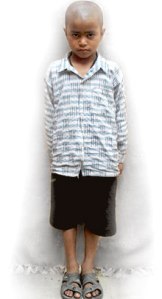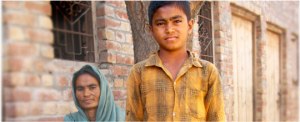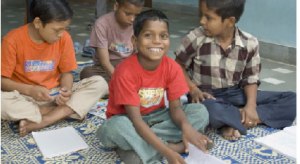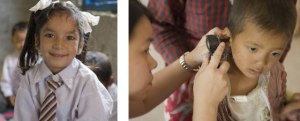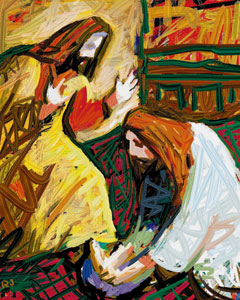Blog Archives
PRAY FOR THE PERSECUTED
THE INTERNATIONAL DAY OF PRAYER is this Sunday, Nov. 4 (or whatever day works for your church, fellowship or group), and believers around the world will be praying for our brothers and sisters in restricted countries who are in chains. Please join millions of “free” Christians as we pray together for millions of our persecuted, suffering and shackled brethren who depend on us to stand with them and intercede for them.
Gospel for Asia’s ministries and missionaries encompass much of the world where persecution takes place, and many GFA ministers suffer daily for their faith and their witness. Watch the video below to get a better idea of the scope and reality of the suffering that so many endure today:
Every day we hear reports of brothers and sisters in Christ being persecuted for their faith. They are stripped of their rights. Their neighbors threaten them with violence and death. Their homes are razed. Their families beat them. And their governments want to slaughter them.
They are our brothers and sisters around the world, boldly believing and proclaiming Christ in places where the penalty for doing so is often death.
Jesus promised His followers that the world would hate and persecute them. Many Gospel for Asia-supported missionaries have come to know the harsh reality of Jesus’ words.
Beatings, death threats and imprisonment are a few of the things they encounter on a daily basis. But despite great hostility, they continue to press onward as they proclaim the Good News of Christ to the unsaved souls of Asia. They are not willing for any man to perish without hearing the name of Jesus, even if that means that they might physically perish.
Don’t Let Them Stand Alone
On November 4, churches across the nation are joining in their suffering by lifting up the persecuted in unified prayer. Share this video with your friends, family and congregation and let them see how their prayers can strengthen Christians as they stand firm in their faith in the one true God.
Follow these links to learn more about the persecuted, and how you can help:
“Blessed are those who are persecuted because of righteousness, for theirs is the kingdom of heaven. Blessed are you when people insult you, persecute you and falsely say all kinds of evil against you because of me. Rejoice and be glad, because great is your reward in heaven.”
Matt. 5:10-12a
Empower Women with the Ability to Read
The Facts
Millions of South Asian women are illiterate. More than half the women in Bangladesh cannot read at all. In India alone, there are an estimated 242 million women who are unable to read—that’s about half the adult women in the country.
Teaching women to read and write opens doors of opportunity and gives them the joy of being able to study God’s Word for themselves. These women are eager to learn; they just need a teacher and a few simple materials.
By Learning to Read – They Stand Firm
But now, through Gospel for Asia’s Women’s Literacy Program, the written world is opening up for the first time. Women learn by reading the Bible, which is the foundational text for the classes, so they gain a knowledge of Scripture even before they’ve completed the course.
Pastors’ wives and women missionaries serve as teachers, so students have the opportunity to grow spiritually under their mentors. The ability to read and understand for themselves also gives these women the confidence to refuse unfair contracts, whether they’re from loan officers or abusive employers.
Many women in GFA-supported churches struggle because they cannot read God’s Word. Help them know the Lord more by giving to Gospel for Asia’s Women’s Literacy Program.
More than one in three women in Asia are illiterate—and the statistic holds true for women in Gospel for Asia-supported churches. Their inability to read leaves them vulnerable to those wanting to take advantage of their ignorance, and without reading the Bible, it’s a challenge to deepen their knowledge of their Savior.
YOU Can Make a Difference!
Illiterate women in Asia face great difficulties. They fail to keep their children safe because they can’t read warning labels. Debt piles up because they can’t understand the bad contracts they sign. They’re cheated in the marketplace because they can’t do basic math. Even if they want to read, there is no way to learn.
With your help, women in Asia can learn to read and will be equipped to tackle life’s hurdles. Click on the link below to find out how you can change someone’s life forever.
CRY ALOUD FOR SYRIA
In Syria.
Slaughter, stench, starvation
Human depravation
Death at every doorstep
Seeks out every soul kept
Screams of insanity
Searching for humanity
Hell is real.
Evil strikes at will
But Love cannot be still
It shakes you to the core
Makes you seek what Life is for
Cry aloud all of my being
For the things that you are seeing
In Syria.
– S.U.
Let’s pray together for peace in Syria.
We cannot be silent before our God.
CHRISTIAN RIGHTS ACTIVIST GAO ZHISHENG RELEASED
Church likely to face another harsh year, report says.
DUBLIN, April 9 (CDN) — Christian human rights activist Gao Zhisheng, kidnapped by state security agents on Feb. 4, 2009, has been released, though he appears unable to move or speak freely.
On Tuesday (April 6) Gao told Bob Fu, president of the U.S.-based China Aid Association (CAA), by telephone that he had just returned to his Beijing apartment from his guarded location in Shanxi Province.
“Gao Zhisheng and his family have suffered deeply from the long separation,” Fu stated on CAA’s website. “Despite the persecution, he continues to trust the Lord.”
On Jan. 9, 2009, less than a month before Gao was abducted in his home village in Shaanxi Province, his family members began their escape from China. His wife, Geng He, along with then 16-year-old daughter Geng Ge and then 5-year-old son Gao Tianyu, arrived on foot to Thailand and eventually reached New York City on March 14, 2009.
With Fu and with reporters from The Associated Press (AP) this week, Gao declined to discuss his physical condition or how he was treated during his captivity. He told the AP that by leaving his role as a critic of human rights violations in China, he hopes to be re-united with his family.
“Gao is still not able to speak or move freely,” Fu said on the CAA website. “We urge the Chinese government now to allow Gao Zhisheng to be reunited with his family. It is his right, according the Chinese law, to be able to see them, since he has broken no laws during his time of probation.”
Gao’s disappearance had drawn protests from international human rights groups, U.S. and British officials and the United Nations. He had defended house church Christians and coal miners as well as members of the banned Falun Gong, which fuses Buddhist-inspired teachings with forms of meditation. In 1999 Beijing banned it as an “evil cult.”
Early in 2009, Gao authorized CAA to release his account of 50 days of torture by state-sponsored thugs in September and October of 2007. Gao had written the account in November 2007 while under house arrest in Beijing after prolonged beatings and electric shocks on his mouth and genitals.
Gao’s suffering in the fall of 2007 followed an open letter he wrote to the U.S. Congress describing China’s torture of Falun Gong members and other human rights abuses.
Another Harsh Year Expected
Chinese Christians can expect more attacks on large urban churches, more harsh punishments for house church leaders and tighter control of registered churches this year, according to CAA.
In a report summarizing persecution it monitored in 2009, CAA identified five key trends in China’s management of Protestant Christianity.
Authorities last year specifically targeted house church leaders, sometimes handing out harsh sentences and fines; carried out violent raids on large urban churches; attempted to disrupt regular worship meetings and tightened control of churches registered with the government-approved Three-Self Protestant Movement (TSPM).
In response, some urban churches engaged in a “power encounter” with local governments, refusing to quietly allow officials to close or destroy their meeting places, CAA noted. For example, almost 1,000 members of Beijing Shouwang church on Nov. 1 worshiped in Haidian Park during a snowstorm after officials pressured Huajie Plaza managers not to renew the church rental contract.
These trends were confirmed by a Chinese House Church Alliance (CHCA) report, released in December, which described harassment and arrest of church leaders, violent raids on house churches and the oppression of TSPM churches.
While CAA reported only 77 incidents in 2009, these occurred throughout China, giving a broad indication of the status of Protestant Christians, particularly those in unregistered churches. A total of 2,935 people were affected in these incidents, a 44.8 percent increase from 2008. Of these, 389 were arrested, a decrease in arrests of 49 percent; and 23 were sentenced to prison, a decline of 34 percent.
Of the 389 people arrested, 211 were church leaders. Several received harsh prison sentences and fines, including Beijing bookstore owner and church leader Shi Weihan, who on June 12 was sentenced to three years in prison and fined 150,000 RMB (US$21,945). Xinjiang officials on Aug. 6 sentenced Uyghur church leader Alimjan Yimit (Alimujiang Yimiti in Chinese) to 15 years in prison, while a day later, officials in Inner Mongolia sentenced church leaders Li Ming-shun and Zhang Yong-hu to 10 and seven years respectively, with fines of 30,000 (US$4,390) and 20,000 (US$2,925) RMB.
A court in Shanxi Province in November awarded five Linfen church pastors sentences ranging from three to seven years, with fines ranging from 10,000 to 50,000 RMB (US$1,462 to US$7,315). A further five pastors were sentenced to two years in labor camp.
At least 400 paramilitary police violently raided the Fushan county branch of Linfen church on Sept. 13, injuring a few dozen church members, confiscating Bibles and money and damaging church property. A similar raid was carried out on another large church in Shanxi Province in November.
Authorities also sealed or destroyed both house church and TSPM church buildings. In one prominent case last June, officials in Chengdu city, Sichuan Province declared Quiyu church to be an illegal organization, forcing the church to close and confiscating church property.
Officials in Rizhao city, Shandong province, raided a training event at a TSPM church and de-registered two church meeting places, CAA reported, while CHCA reported that officials tore down the meeting place of Changchun church in Ninan city, Shandong Province, giving only token compensation.
Churches in ‘Grey’ Zone
Chinese scholar and former policy writer Liu Peng believes the government is attempting to remove the “grey” zone in Protestant Christianity, where some churches operate openly without legal status.
China now permits churches to bypass joining the TSPM when registering, but many house church groups reject this solution. Leaders would prefer churches to be in one camp or the other, Liu said in a December interview with the China Daily.
In predicting harsher treatment this year, CAA quoted Wang Zuoan, head of the State Administration for Religious Affairs, who in January told Oriental Outlook that the “reluctance, intimidation and inability” of local governments to deal with religious issues must be addressed.
If these words represent China’s religious policy direction in 2010, churches are likely to be targets of greater persecution, CAA concluded.
